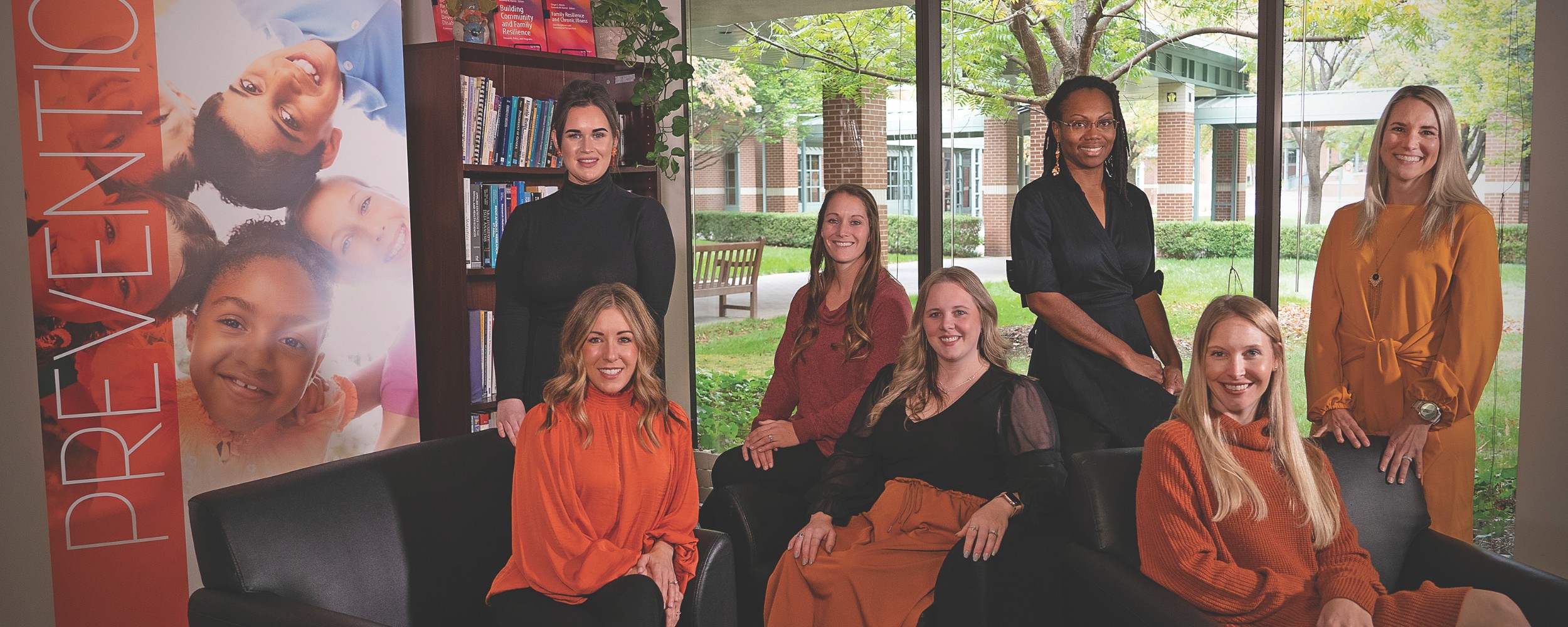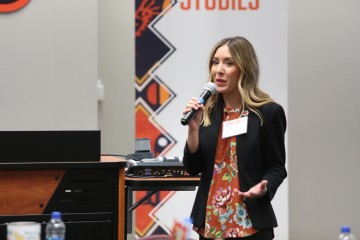
Remarkable Resilience: Center for Family Resilience director discusses strength of the human spirit
Tuesday, October 15, 2024
Media Contact: Christy Lang | Director, Marketing and Communications | 405-744-9740 | christy.lang@okstate.edu
As a high school student, Dr. Brooke Tuttle’s life reflected the best parts of growing up in small-town America.
Tuttle was active in her school, excelled academically and grew up surrounded by supportive and stable adults in her hometown of Lawson, Missouri.
Tuttle soon became aware of the stark differences between her experiences and those of her peers. While she applied to colleges, some of her classmates were expelled, dropped out or had run-ins with the justice system.
Over two decades later, Tuttle still gets emotional recalling the struggles of some of her peers during adolescence.
“There was this feeling of, ‘Something's not right here,’” Tuttle said. “You would see kids in situations they couldn’t control and see their lives unraveling.”
As a teenager, Tuttle did not understand why some of her peers were not granted the same opportunities as she was, but she said her experiences sparked a passion to help overlooked communities.
That mission took Tuttle from her rural hometown to Tulsa to serve as the director of Oklahoma State University’s Center for Family Resilience, where her efforts to bridge the divide between academia and communities and build better outcomes for Oklahoma families garnered her a selection to Oklahoma Magazine’s 2024 40 Under 40 list.
Since the beginning of her career, Tuttle said she believed systematic changes were required to truly impact at-risk communities.
“You’ve got to go way upstream,” Tuttle said. “If you don't address those root causes,
through prevention, through education, through research, then you're not going upstream far
enough. We're just going to keep locking people up, and that's not the solution.”
prevention, through education, through research, then you're not going upstream far
enough. We're just going to keep locking people up, and that's not the solution.”
When Tuttle began pursuing a Ph.D. in human development and family science at OSU, professors encouraged her to join the Center for Family Resilience. Dr. Amanda Harrist served as an associate director of the center before retiring in 2024. Harrist knew Tuttle’s compassion made her a perfect fit for the Center for Family Resilience, and she has been proud to watch Tuttle grow from a student to a director.
“For a long time in family sciences, we studied risk,” Harrist said. “But at the center, we emphasize resilience. We emphasize beating the odds.
“That’s how Brooke lives her life. She always is looking for the good in life and wants to know how to make good happen, but she does it in a very practical manner.”
Tuttle said this practical optimism is why she was initially drawn to the study of resilience and now aims to build resilience with organizations and agencies throughout Oklahoma.
“Resilience is something that’s built,” Tuttle said. “It’s not a trait. It’s not innate. It’s built by people and communities, and it’s built over time.
“Oklahoma has seen real tragedy and trauma. Think of the Dust Bowl, the Tulsa Race Massacre, the forced removal that impacted our Native American neighbors and communities, the Oklahoma City bombing ... Oklahomans are still working to move forward from these events, and I really admire that.”
Tuttle works with nonprofit organizations, state agencies and researchers from almost every discipline. Ginger Welch, a clinical professor of human development and family science and associate director at the Center for Family Resilience, said Tuttle’s specialty was synthesizing information from agencies, community members and researchers to create programs with lasting impacts.
“When she looks at a social problem, she sees all parts of it,” Welch said. “She understands the lifespan, the family system and the community.
“And she really is joined with the community. She doesn't say, ‘I'm gonna give you something, I'm gonna do something for you.’ She comes alongside.”
For Tuttle, partnering with community organizations and agencies makes the center especially effective. The Center for Family Resilience’s position in both academia and in the human services community was crucial for bringing cutting-edge research to practitioners and families, who may be unaware of or unable to access the information they need.
“When you're thinking about where the research lands, it's (often) landing in fancy journals for fancy people to read,” Tuttle said. “But your family down the street who's struggling to make ends meet, they're not reading nor do they have access to those journals. Neither do a lot of professionals.”
Tuttle said this gap between research and application is pervasive in academia, as many universities do not actively encourage their professors and researchers to conduct community-focused research. Although she says OSU is more supportive of community-oriented work because of its land-grant mission, Tuttle also acknowledged connecting researchers and families was an ongoing effort.
“We try to create experiences for people to learn from one another because we want (research) to be really bi-directional,” Tuttle said. “You don't just want to get the research to the community. You also want the community to have pathways to get their big challenges back to the researcher so they can work on those things together.”
Tuttle said part of creating pathways meant she and her staff work to promote research to their community. Although Tuttle spent most of her professional career working with at-risk youth, she found the community that impacted her research the most was the one she married into.
As the spouse of a state trooper, Tuttle said she felt obligated to support the people who sacrificed so much. Years of witnessing the struggles of soldiers, first responders, and their families inspired her to pursue research that was informed by lived experiences unfamiliar to many in the academic realm.
“If you don't have some lived experience with the population, it's not on people's radar to be interested in it,” Tuttle said. “It's not a universal experience like education or family or childhood. If you’re not connected to first responders, it is hard to find people who want to study that population.”
Tuttle said that though first responders face significant daily challenges, little research has focused on promoting their mental well-being and that of their families. With long, dangerous shifts, unusual schedules and a chaotic lifestyle, Tuttle said more intervention and training was required to ensure first responders do not bring the stress of their jobs home with them in an unhealthy manner.
“First responders are constantly exposed to pretty significant traumas,” Tuttle said. “If they’re not prepared to effectively deal with that, and the family is not prepared to effectively support their first responders, it can impact the family unit, the communication and the emotional climate of the family.”
Although research on first responders is a relatively new field, Tuttle said the small community is highly collaborative. Tuttle said she was incredibly proud of the partnership she formed with Dr. Jay Dawes, an assistant professor of kinesiology, applied health and recreation, and Dr. Jill Joyce, an associate professor of nutritional sciences. Dawes and Joyce co-direct OSU’s Tactical Fitness and Nutrition Lab, but they have increasingly relied on Tuttle’s expertise on resilience to support the physical, mental and social health of first responders.
Joyce, who is married to an Army veteran, said spouses and family played a significant role in the overall health of first responders. However, there were few resources to prepare first responders and their families for the stress of their jobs.
“That life is insanely hard for spouses and children,” Joyce said. “Your job gets uprooted, your friend group gets uprooted, and nobody's there to help you when you get to the next base. I see a lot of spouses struggle and it breaks my heart. There's nothing for them.
“We see the influence that family, especially spouses and children, have on the groups that we work with, but there's not a ton of research on that. That’s where Dr. Tuttle comes in. She is an expert on family influences; she makes us a more complete picture.”
This summer, a prep academy training program was piloted in select first responder agencies across Oklahoma to prepare first responder recruits and cadets to thrive in their careers from a holistic wellness and resilience perspective. Joyce said she hopes the program will not only make cadets more successful as they train to become first responders but also prepare families for long-term success, an outcome she said would not be possible without Tuttle’s expertise.
“We study very different things,” Tuttle said. “But we're interested in the same population and ultimately the same goal of wellness for first responders. It's a nice point of intersection in multidisciplinary work.”
Tuttle said these intersections between disciplines, experiences and communities are what make her work so powerful, and she’s thankful to be able to collaborate with other passionate community members and address the issues that troubled her when she was young.
“There were things about adverse childhood experiences and family dynamics we didn’t understand 20 years ago,” Tuttle said. “We just had an issue and wanted to understand it and to do something about it. So that's what I'm doing.”
Photos By: Ryan Jensen and Kelly Kerr
Story By: Jessica Pearce | ASPIRE Magazine
